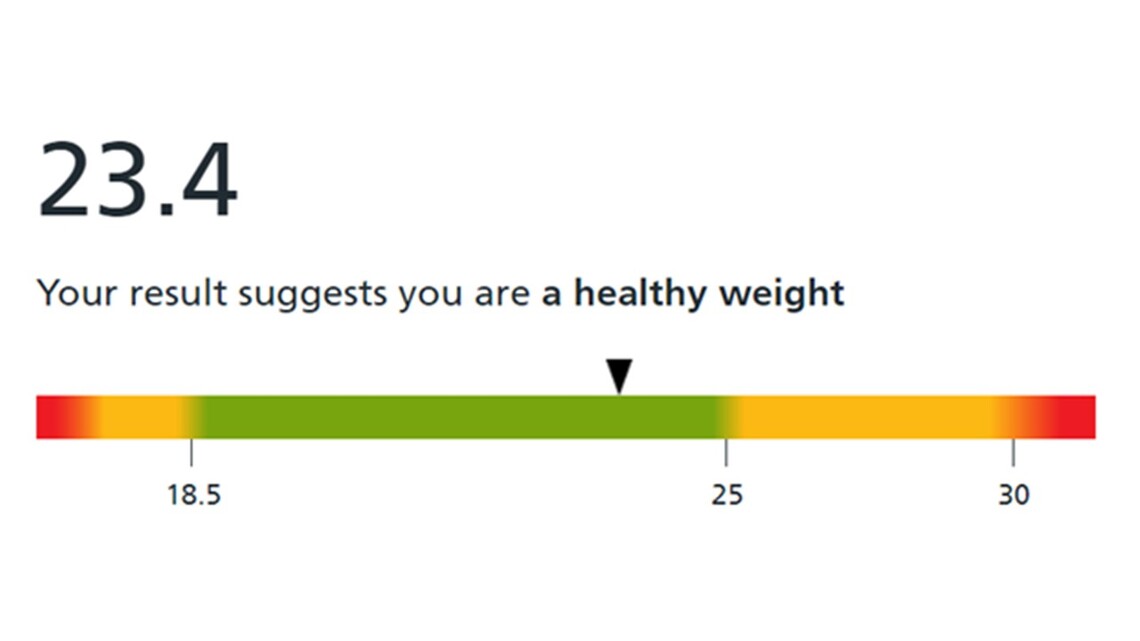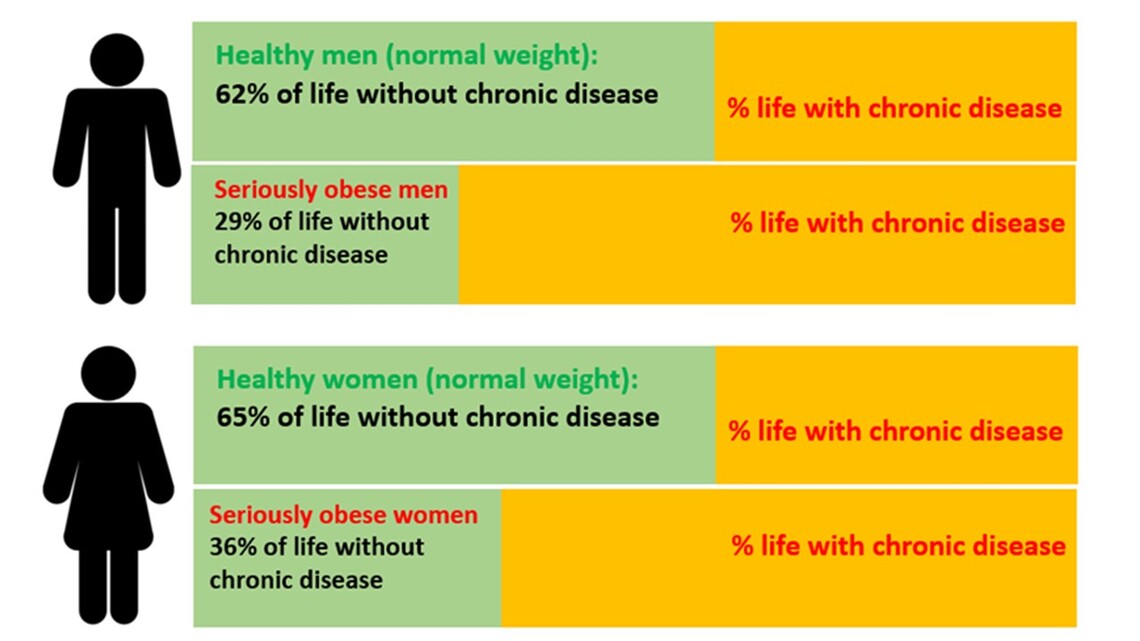Fatness or Fitness?
Do you find it difficult to get your weight down? If so, can keeping physically fit reduce the health risks? Can keeping slim compensate if you don’t do much exercise?
In this article, we answer these leading questions using evidence from recent medical research.
- How can I tell if I’m overweight or obese?
- Obesity and general health
- Obesity and life expectancy
- Obesity and health expectancy
- ‘Metabolic fitness’ and reducing the risk of developing CVD and cancer
- Poor cardiorespiratory fitness and high BMI
- Obesity and women’s health
- Obesity and chronic pain
How can I tell if I’m overweight or obese?
An objective way to see if you are medically overweight is to check your Body Mass Index (BMI). This measures whether you're a healthy weight for your height. You can work out your BMI using this NHS calculator.
Here’s an example of a healthy BMI:

Obesity and general health
The World Health Organisation highlights a range of health-related issues associated with obesity. These include cardiovascular diseases (heart disease and stroke have become the leading cause of death worldwide in recent years), diabetes, several types of cancer, as well as musculoskeletal disorders (especially osteoarthritis), and respiratory issues (particularly in children). Current worldwide increases in BMI are likely to lead to further increases in the risk of these non-communicable diseases.
How long we live is important to us, but so too is how good our health is while we’re alive. Here the research suggests that excess weight, especially obesity, has a negative effect on many aspects of our health.
|
Excess weight, especially obesity, diminishes almost every aspect of health, from reproductive and respiratory function to memory and mood.
|
Another article on the Age Watch website provides more detail on the causes and the health consequences of being obese.
Obesity and life expectancy
Being overweight does not appear to significantly reduce life expectancy. However, there is an increasing risk of mortality (from all causes) as you become obese, from lower-level obesity (BMI of 30 to 35) through to serious obesity (BMI >35). Risk of death is also significantly higher in normal-weight individuals who have a history or being overweight or obese, compared to those who maintain a normal healthy weight.
Obesity and health expectancy
Associations have also been found between excess BMI (serious obesity) and substantially shorter healthy and chronic disease-free life expectancy (also called ‘health expectancy’). This study, involving 75,000 individuals, concluded that serious obesity in men or women significantly reduced their health expectancy.
‘Metabolic fitness’ and reducing the risk of developing CVD and cancer
Fortunately, there’s a way you can bring down your risk of developing, or dying from, heart disease or cancer if you are obese.
|
Take regular exercise!
|
Provided you are metabolically fit and have no complications or problems metabolising food, you can reduce your risk of developing CVD or cancer closer to that of someone who is a normal weight for their height. That was the finding from a study by US and European researchers published in the European Heart Journal in 2012.
However, research published in 2018, based on data from over half a million people in Europe, suggests that the picture isn't quite so rosy. Following a healthy lifestyle reduces the risk of coronary heart disease (CHD), regardless of weight, but if you are overweight or obese you still increase the risk of CHD by over 25% compared with someone who is a normal weight.
Poor cardiorespiratory fitness and high BMI
Both poor cardiorespiratory (physical) fitness and a high BMI have been shown to increase CVD mortality risk. Data from 2018 suggests that this measure of fitness is a stronger predictor of the mortality risk of CVD compared to using BMI as a predictor. While an elevated BMI was associated with a higher CVD mortality risk, being physically fit significantly reduced this risk.
|
Overall, people considered as being obese and unfit have the highest mortality risk (triple) compared to normal-weight, fit individuals.
|
In a recent review of 25 studies conducted in 2019, it was found that individuals with higher levels of physical activity combined with other positive health behaviours, including not smoking and healthier eating habits, were at least half as likely to experience a CVD incident or death from any cause. This comparison was made against those who were considered physically inactive and who did not adhere to positive health behaviours.
Obesity and women’s health
Diabetes 2
According to a 2009 systematic review, simply being overweight significantly increases the risk of diabetes 2 for women. Of all the diseases associated with obesity – CVD, cancers, osteoarthritis etc. – diabetes 2 in women was found to have the strongest association with being overweight (as defined by BMI).
|
If you are obese, you need to make a serious commitment to diet and exercise to significantly reduce the risk of diabetes. |
There is also a well-established link between obesity and postmenopausal breast cancer. This link was further confirmed by the meta-analysis of 51 studies which included 52,705 women with breast cancer and 108,411 women without breast cancer.
Pregnancy
Being overweight can negatively affect contraception and fertility, so it's important, even before conception, to eat a healthy, balanced diet and do some physical activity every day (following professional advice).
This is also the NHS recommendation during pregnancy, with the added advice not to try to lose weight during pregnancy, as this will not reduce the chance of complications and may not be safe for either mother or baby.
|
NHS health recommendations for overweight mothers include: • Try to eat healthily, including knowing which foods to eat and which to avoid during pregnancy. • Try to be physically active during pregnancy. This will not harm the baby, so try activities such as walking or swimming. |
Being obese and pregnant increases the risk of your baby dying within the first 28 days after birth (neonatal mortality) or having malformations. These were some of the negative outcomes of pregnancy reported in a 2011 review of obesity and women’s health.
Maternal obesity is also linked with higher rates of caesarean section, as well as with higher rates of high-risk obstetrical conditions such as diabetes and hypertension.
Obesity and chronic pain
Regardless of gender, obesity has other negative side effects, such as chronic pain.
|
36% of obese Americans say they have a knee or leg condition compared with 19% of those who maintain a normal weight.
|
However, this 2011 research also points out that medical conditions that cause chronic pain, such as arthritis, might also be the result of lower levels of exercise, which in turn can lead to weight gain.
A survey of over a million Americans found that pain rates were 68% to 254% higher in people who were obese compared with those who weren’t.
Conclusions
- Know your BMI and use it as a rough guide for your weight goals.
- A BMI of 30 or over increases your risk of dying younger, as does a history of being overweight or obese.
- Being physically active reduces at least two health risks: heart disease and cancer, but being physically active, combined with a healthy weight, provides the greatest reduction in risk.
- Low fitness levels and low physical activity may be even bigger health risks than obesity.
- Obesity increases a range of other health risks, such as type 2 diabetes (especially for women) as well as other negative side effects such as higher levels of pain, and may even reduce the years of our lives which are free of chronic disease.
- Maintaining a normal weight and getting plenty of exercise will reduce your risk of a wide range of chronic health problems.
Harrison Prince, April 2022. Next review, March 2026.
_________________________________________
Other relevant articles on the Age Watch website:
- Tackling obesity: Obesity – Causes and consequences
- Tackling obesity: Losing weight
- Tackling obesity: Preventing obesity
- Tackling obesity: Who is really responsible for obesity
- Living longer: Look after your body
- Diet: What determines our food choices?

